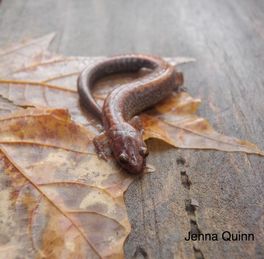|
.By Jenna Quinn I often find myself explaining my job to people. Family, friends, acquaintances - it is not uncommon for me to get a “and that is your job!?” response when I tell them about how I spent the day counting butterflies, walking trails, measuring trees, rescuing turtles, identifying salamanders, locating lady slippers, or any other highlight (I rarely talk about the office work…it just doesn’t measure up!). The most common question I get about the monitoring projects is why? Why should I care about salamanders? What do they do, how do they help, why do we monitor them? Studying zoology at university, I struggled to understand how everyone in my life didn’t find everything I was learning as fascinating as I did. I’d bombard my family and friends with whatever animal trivia I learned that day and expect them to be just as awed and wowed as I was. When I get asked about why salamanders are important, I often feel like I did back then. “Because they are incredible, awesome, cool creatures!” I, like many others, see an intrinsic value in salamanders just because they exist. I want to watch them, learn about them, protect them. The truth is that everyone sees value in things in their own way and for some people salamanders just aren’t on the top of the list. And that’s okay! Luckily there are a lot of other reasons why we should all care about salamanders and keep them from going the way of the Dodo. Salamanders are both a predator and a prey species, making them an essential link in the food chain in most forest ecosystems. They are ferocious predators of insects and arthropods making them a natural pest control. Some salamanders, like the Spotted Salamander, have larval forms that eat aquatic insects, helping to control pesky populations of mosquitoes by feeding on their larvae. Some larger salamander species (not found in Ontario) even eat small rodents! Salamanders are, in turn, eaten by rodents, birds, and snakes. As the most common vertebrate species in most forests, they are an important and abundant food source to sustain other wildlife. By being efficient predators of insects and providing ample food for other species, salamanders play an important role in transferring energy up the food chain. They also help manage decomposition and nutrient cycling in the forest ecosystem by being active predators of invertebrates. One of my favourite reasons to care about salamanders unsurprisingly tied back to monitoring. Lungless salamanders, like the abundant Eastern Red-backed Salamander, are excellent indicator species as they are highly sensitive to contaminants in their environment. They can be quick to respond to environmental stresses like pollution and can therefore be very informative! Whether the sight of a salamander makes you feel squeamish or delighted, there are many great reasons to protect them. So, let’s ensure they can continue to play an important role in our ecosystems!
1 Comment
11/7/2019 07:47:00 pm
Dealing with salamanders is quite unusual job. But that’s okay as long as it makes you happy and you earn money from it. People will always have something to say whether we act based on their standards. Might as well do the things that make you happy, isn’t it? Besides, your job is pretty interesting because there is no other toxic people you deal with, because you’re with animals most of the time. I find it very relaxing when your job doesn’t have to do with discussing with other people a lot!
Reply
Leave a Reply. |
ELB MembersBlogs are written by ELB members who want to share their stories about Ontario's biodiversity. Archives
January 2023
Categories
All
|



 RSS Feed
RSS Feed